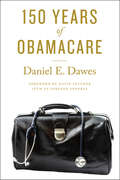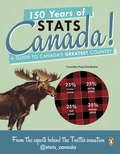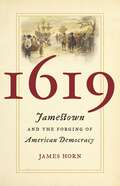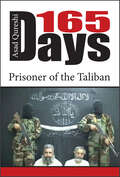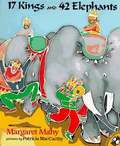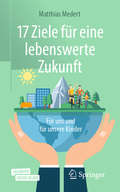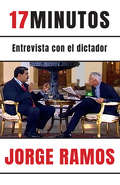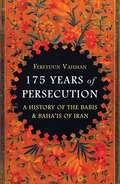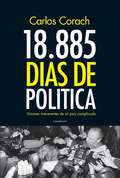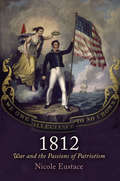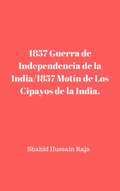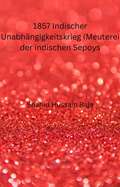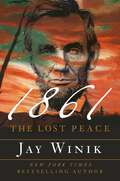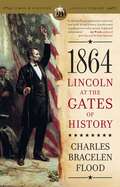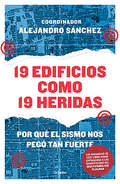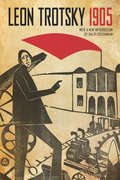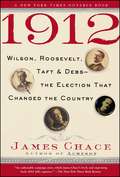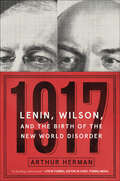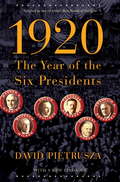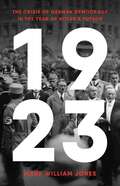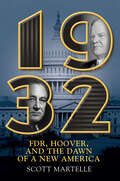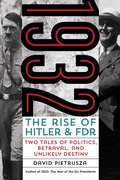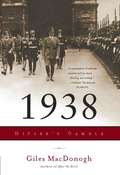- Table View
- List View
150 Years of ObamaCare
by Daniel E. DawesGo behind the curtain of the creation and implementation of the Affordable Care Act.In this groundbreaking book, health-care attorney Daniel E. Dawes explores the secret backstory of the Affordable Care Act, shedding light on the creation and implementation of the greatest and most sweeping equalizer in the history of American health care. An eye-opening and authoritative narrative written from an insider’s perspective, 150 Years of ObamaCare debunks contemporary understandings of health reform. It also provides a comprehensive and unprecedented review of the health equity movement and the little-known leadership efforts that were crucial to passing public policies and laws reforming mental health, minority health, and universal health.An instrumental player in a large coalition of organizations that helped shape ObamaCare, Dawes tells the story of the Affordable Care Act with urgency and intimate detail. He reveals what went on behind the scenes by including copies of letters and e-mails written by the people and groups who worked to craft and pass the law. Dawes explains the law through a health equity lens, focusing on what it is meant to do and how it affects various groups. Ultimately, he argues that ObamaCare is much more comprehensive in the context of previous reform efforts than is typically understood.In an increasingly polarized political environment, health reform has been caught in the cross fire of the partisan struggle, making it difficult to separate fact from fiction. Offering unparalleled and complete insight into the efforts by the Obama administration, Congress, and external stakeholders, 150 Years of ObamaCare illuminates one of the most challenging legislative feats in the history of the United States.
150 Years of Stats Canada!: A Guide to Canada's Greatest Country
by Stats CanadaCanada's funniest online sensation is back to celebrate the country's 150th anniversary--bigger, bolder, and only 10% reused material!Want to know what the hottest new Canadian apps are? Need a handy chart to help you decide what Can-Con music to listen to? How about the top Google searches across the nation? In this handy guide to Canada, the tireless experts at @stats_canada reveal all the must-know quirks from coast to coast to frigid coast. From helpful tips on the Vancouver housing market to planning the ultimate Montreal bachelor party, Stats Can is on the case. And discover just how Canadian you are with the official checklist, not to mention the Tim Hortons etiquette quiz. With crucial updates about Canada on its big birthday, and all the stats, charts, and graphs to back them up, 150 Years of Stats Canada! is the perfect way to celebrate everything we love about this great country. Disclaimer: still 100.6% not affiliated with Statistics Canada
1619: Jamestown and the Forging of American Democracy (Published By The Omohundro Institute Of Early American History And Culture And The University Of North Carolina Press Ser.)
by James HornAn extraordinary year in which American democracy and American slavery emerged hand in handAlong the banks of the James River, Virginia, during an oppressively hot spell in the middle of summer 1619, two events occurred within a few weeks of each other that would profoundly shape the course of history. In the newly built church at Jamestown, the General Assembly--the first gathering of a representative governing body in America--came together. A few weeks later, a battered privateer entered the Chesapeake Bay carrying the first African slaves to land on mainland English America.In 1619, historian James Horn sheds new light on the year that gave birth to the great paradox of our nation: slavery in the midst of freedom. This portentous year marked both the origin of the most important political development in American history, the rise of democracy, and the emergence of what would in time become one of the nation's greatest challenges: the corrosive legacy of racial inequality that has afflicted America since its beginning.
165 Days: Prisoner of the Taliban
by Asad QureshiA gripping first-person account of long-term captivity at the hands of terrorists in Waziristan, the dangerous border region between Pakistan and Afghanistan. While Asad was held hostage, his family struggled mightily to free him. This book highlights not only the will to survive, but also the love of family.There are several popular accounts of Taliban hostages who were rescued by American Special Forces; Asad was handed over to and escorted home by operatives of Al Qaeda.
17 Kings and 42 Elephants
by Margaret MahyWhere those kings are headed is a mystery, but no travelers ever had such a jolly time. Here is a royal romp through a tongue-twisting paradise.
17 Ziele für eine lebenswerte Zukunft: Für uns und für unsere Kinder
by Matthias MedertVielleicht machst auch du dir Sorgen darüber, wohin die vielen ökologischen und sozialen Probleme führen werden, von welcher Art und Ausmaß die Konsequenzen sein können und wie diese das Leben von Menschen betreffen werden? Dann könnte dieses Buch interessant für Dich sein: Es beschreibt anhand der 17 UN-Nachhaltigkeitsziele eine Vision für eine lebenswerte Zukunft. Du erfährst kurz und verständlich zu jedem der Ziele konkrete Hintergründe, Zusammenhänge und Herausforderungen, die es auf dem Weg dorthin noch zu meistern gilt. Es macht die Themen greifbar - sowohl global als auch bezogen auf Deutschland. Gleichzeitig liefert Dir das Buch Anregungen, wie Du selbst dazu beitragen kannst, die großen Probleme der Menschheit zu lösen: Klimawandel, Energie, Plastikmüll, Artenvielfalt, Umweltschutz, Hunger, Armut, etc.Zusammen können wir es schaffen, die 17 Ziele umzusetzen, indem wir sie mit konkreten Inhalten füllen. Falls uns das gelingt fragen unsere Kinder vielleicht eines Tages: „Wie habt ihr damals die Erde gerettet und die Menschheit in das Zeitalter der sozialen Gerechtigkeit geführt?“
17 minutos: Entrevista con el dictador
by Jorge Ramos ÁvalosEl libro sobre cómo el autor desenmascaró a Maduro ante las cámaras: con todo lo que ocurrió antes y después. El 25 de febrero de 2019, apoyado por su equipo de Univisión, Jorge Ramos realizó una entrevista al dictador de Venezuela, Nicolás Maduro. Preparada minuciosamente, pasado el primer cuarto de hora, y luego de evidenciar su disgusto por el severo cuestionamiento del periodista (fiel a su compromiso de confrontar a los poderosos), el entrevistado la dio por terminada abruptamente. Se producía así un tremendo acto de censura que implicó confiscar el equipo de grabación, la detención del periodista y finalmente su deportación. Con un estilo directo y crítico, Jorge narra los recovecos de esta peligrosa experiencia periodística que tuvo repercusión mundial, incluyendo lo que hizo para no ser encarcelado, salvar a sus colaboradores y recuperar, tiempo después, la entrevista requisada.
175 Years of Persecution: A History of the Babis & Baha'is of Iran
by Fereydun VahmanFor almost two centuries, followers of the Baha&’i faith, Iran&’s largest religious minority, have been persecuted by the state. They have been made scapegoats for the nation&’s ills, branded enemies of Islam and denounced as foreign agents. Since the Islamic Revolution of 1979 Baha&’is have been barred from entering the nation&’s universities, more than two hundred have been executed, and hundreds more imprisoned and tortured. Now, however, Iran is at a turning point. A new generation has begun to question how the Baha&’is have been portrayed by the government and the clergy, and called for them to be given equal rights as fellow citizens. In documenting, for the first time, the plight of this religious community in Iran since its inception, Fereydun Vahman also reveals the greater plight of a nation aspiring to develop a modern identity built on respect for diversity rather than hatred and self-deception.
18.885 días de política: Visiones irreverentes de un país complicado
by Carlos CorachUn interesante y lúcido relato de memorias de 18.885 días de actividadpolítica, que se leen en uno. Carlos Corach confiesa aquí que ha vivido (y sigue viviendo) una intensavida política: del desarrollismo al menemismo, del Colegio Nacional deBuenos Aires al Pacto de Olivos, el ex ministro del Interior repasa cadapeldaño, cada alegría, cada traspié y cada enseñanza de su carrera. Noevita tema alguno y subraya en todos una necesidad que hoy pareceolvidada: la del diálogo como herramienta principal de la política. DiceCorach en estas memorias como un apasionante manual de historiaargentina reciente: «Entendí que la política exige comprender y aceptarla diversidad de opiniones, que siempre hay que dialogar con aquelloscon quienes disentimos y que la relación con los adversarios,permanentes o circunstanciales, exige siempre el respeto mutuo».
1812
by Nicole EustaceAs military campaigns go, the War of 1812 was a disaster. By the time it ended in 1815, Washington, D.C., had been burned to the ground, the national debt had nearly tripled, and territorial gains were negligible. Yet the war gained so much popular support that it ushered in what is known as the "era of good feelings," a period of relative partisan harmony and strengthened national identity. Historian Nicole Eustace's cultural history of the war tells the story of how an expensive, unproductive campaign won over a young nation--largely by appealing to the heart.1812 looks at the way each major event of the war became an opportunity to capture the American imagination: from the first attempt at invading Canada, intended as the grand opening of the war; to the battle of Lake Erie, where Oliver Perry hoisted the flag famously inscribed with "Don't Give Up the Ship"; to the burning of the Capitol by the British. Presidential speeches and political cartoons, tavern songs and treatises appealed to the emotions, painting war as an adventure that could expand the land and improve opportunities for American families. The general population, mostly shielded from the worst elements of the war, could imagine themselves participants in a great national movement without much sacrifice. Bolstered with compelling images of heroic fighting men and the loyal women who bore children for the nation, war supporters played on romantic notions of familial love to espouse population expansion and territorial aggression while maintaining limitations on citizenship. 1812 demonstrates the significance of this conflict in American history: the war that inspired "The Star-Spangled Banner" laid the groundwork for a patriotism that still reverberates today.
1857 Guerra de Independencia de la India/1857 Motín de Los Cipayos de la India.
by Shahid Hussain RajaEl 27 de abril de 1857, ochenta y cinco soldados de un regimiento Bengalí de la British East Indian Company, publicado en Meerut, desobedecieron las órdenes de su oficial británico superior, de usar los nuevos cartuchos para los nuevos rifles Enfield, presuntamente empacados en grasa de vaca y cerdo. Se les impuso un castigo severo a los soldados desobedientes, y esto también frente a sus colegas, resultando en el motín de varios regimientos y finalmente se convirtió en un levantamiento general de la gente de India. Fueron despiadadamente reprimidos por los británicos con la ayuda de su tecnología superior y soporte de las élites locales. Sin embargo, como cualquier evento cataclísmico, dio origen a diferentes tendencias sociales, políticas y económicas, las cuales todavía están dando forma al curso de acontecimientos en los estados postcoloniales de India, Pakistán, Bangladesh y otros países del subcontinente Indio. Este pequeño manual intenta descubrir la naturaleza, causas y consecuencias de este hito tan importante de la historia de las luchas de la gente de India por la Independencia. Esto explica el trasfondo de la Guerra de Independencia de India en 1857 o como algunos escritores le llaman, El Motín de los Cipayos de la India de 1857, enumera en detalle las causas sociales, económicas y políticas de este acontecimiento trascendental, narra el curso de los eventos, razones de su fracaso y termina con un análisis acerca del impacto a largo y corto plazo. Por último, argumenta que muchas de las tendencias de hoy en día en India, Pakistán y Bangladesh tienen sus raíces en políticas adoptadas por los administradores británicos en las secuelas de este levantamiento.
1857 Indischer Unabhängigkeitskrieg (Meuterei der indischen Sepoys): Ursachen und Folgen
by Shahid Hussain RajaErläutert die Hintergründe des indischen Unabhängigkeitskrieges von 1857 oder das, was ein Teil der Schriftsteller als "Sepoy's Mutiny" von 1857 bezeichnet, zählt detailliert die sozialen, wirtschaftlichen und politischen Ursachen dieses folgenschweren Ereignisses auf, schildert den Verlauf der Ereignisse, die Gründe für das Scheitern und endet mit einer detaillierten Analyse der lang- und kurzfristigen Auswirkungen.
1861: The Lost Peace
by Jay WinikFrom an award-winning historian and New York Times bestselling author, a gripping, fly-on-the-wall account of the weeks leading up to Abraham Lincoln's decision to go to war against the Confederacy.1861: The Lost Peace is the story of President Lincoln&’s difficult and courageous decision at a time when the country wrestled with deep moral questions of epic proportions. Through Jay Winik&’s singular reporting and storytelling, readers will learn about the extraordinary Washington Peace Conference at the Willard Hotel to avert cataclysmic war. They will observe the irascible and farsighted Senator JJ Crittenden, the tireless moderate seeking a middle way to peace. Lincoln himself called Crittenden &“a great man&” even as Lincoln jousted with him. Readers will glimpse inside Lincoln&’s cabinet—the finest in history—which rivaled the executive in its authority, a fact too often forgotten, and witness a parade of statesmen frenetically grasping for peace rather than the spectacle of a young nation slowly choking itself to death. A perfect read for history buffs, with timely overtones to our current political climate.
1864
by Charles Bracelen FloodIn a masterful narrative, historian and biographer Charles Bracelen Flood brings to life the drama of Lincoln's final year, in which he oversaw the last campaigns of the Civil War, was reelected as president, and laid out his majestic vision for the nation's future in a reunified South and in the expanding West.
18885 DÍAS DE POLITICA (EBOOK)
by Carlos CorachCarlos Corach confiesa aquí que ha vivido (y sigue viviendo) una intensa vida política: del desarrollismo al menemismo, del Colegio Nacional de Buenos Aires al Pacto de Olivos, el ex ministro del Interior repasa cada peldaño, cada alegría, cada traspié y cada enseñanza de su carrera. No evita tema alguno y subraya en todos una necesidad que hoy parece olvidada: la del diálogo como herramienta principal de la política. Dice Corach, en estas memorias de 18.885 días que se leen en uno, como un apasionante manual de historia argentina reciente: "Entendí que la política exige comprender y aceptar la diversidad de opiniones, que siempre hay que dialogar con aquellos con quienes disentimos y que la relación con los adversarios, permanentes o circunstanciales, exige siempre el respeto mutuo".
19 edificios como 19 heridas: Por qué el sismo nos pegó tan fuerte
by Alejandro SánchezEl 19 de septiembre de 2017 un terremoto azotó México. Murieron 369 personas. Pero no las mató el sismo. Los responsables fueron la corrupción, la impunidad, la dejadez, el olvido e incluso la falta de cultura cívica. A un año del desastre, esta obra investiga qué salió mal en 19 de los edificios más dañados por el temblor. ¿Por qué hubo tantos muertos 32 años después del terremoto de 1985? El libro, así, pinta cuáles son los problemas que resquebrajaron México... y alerta: si no se solucionan, volverá a ocurrir una tragedia similar. Reportajes de: Óscar Alarcón - Hugo Corzo Zanabria - Silvia Garduño Francisco Goldman - Édgar Ledesma Gasca - Albinson Linares Francisco Nieto - Ernesto Núñez Albarrán - Georgina Olson Jiménez Peniley Ramírez - Paris Alejandro Salazar - Nantzin Saldaña Neldy San Martín # Alejandro Sánchez - Laura Sánchez Ley Claudia Solera - Laura Toribio - Daniel Venegas. Las ganancias de este libro serán entregadas a los damnificados del Multifamiliar Tlalpan.
1905
by Leon TrotskyLeon Trotsky's 1905-despite long being out of print-has remained the central point of reference for those looking to understand the rising of workers, peasants, and soldiers that nearly unseated the Tsar in 1905. Trotsky's elegant, beautifully written account draws on his experience as a key leader of the revolution.
1912
by James ChaceFour extraordinary men sought the presidency in 1912. Theodore Roosevelt was the charismatic and still wildly popular former president who sought to redirect the Republican Party toward a more nationalistic, less materialistic brand of conservatism and the cause of social justice. His handpicked successor and close friend, William Howard Taft, was a reluctant politician whose sole ambition was to sit on the U.S. Supreme Court. Amiable and easygoing, Taft was the very opposite of the restless Roosevelt. After Taft failed to carry forward his predecessor's reformist policies, an embittered Roosevelt decided to challenge Taft for the party's nomination. Thwarted by a convention controlled by Taft, Roosevelt abandoned the GOP and ran in the general election as the candidate of a third party of his own creation, the Bull Moose Progressives.Woodrow Wilson, the former president of Princeton University, astonished everyone by seizing the Democratic nomination from the party bosses who had made him New Jersey's governor. A noted political theorist, he was a relative newcomer to the practice of governing, torn between his fear of radical reform and his belief in limited government. The fourth candidate, labor leader Eugene V. Debs, had run for president on the Socialist ticket twice before. A fervent warrior in the cause of economic justice for the laboring class, he was a force to be reckoned with in the great debate over how to mitigate the excesses of industrial capitalism that was at the heart of the 1912 election.Chace recounts all the excitement and pathos of a singular moment in American history: the crucial primaries, the Republicans' bitter nominating convention that forever split the party, Wilson's stunning victory on the forty-sixth ballot at the Democratic convention, Roosevelt's spectacular coast-to-coast whistle-stop electioneering, Taft's stubborn refusal to fight back against his former mentor, Debs's electrifying campaign appearances, and Wilson's "accidental election" by less than a majority of the popular vote.Had Roosevelt received the Republican nomination, he almost surely would have been elected president once again and the Republicans would likely have become a party of reform. Instead, the GOP passed into the hands of a conservative ascendancy that reached its fullness with Ronald Reagan and George W. Bush, and the party remains to this day riven by the struggle between reform and reaction, isolationism and internationalism. The 1912 presidential contest was the first since the days of Jefferson and Hamilton in which the great question of America's exceptional destiny was debated. 1912 changed America.
1912: Wilson, Roosevelt, Taft & Debs - the Election That Changed the Country
by James Chace Ellen R. SasaharaBeginning with former president Theodore Roosevelt's return in 1910 from his African safari, Chace brilliantly unfolds a dazzling political circus that featured four extraordinary candidates. When Roosevelt failed to defeat his chosen successor, William Howard Taft, for the Republican nomination, he ran as a radical reformer on the Bull Moose ticket. Meanwhile, Woodrow Wilson, the ex-president of Princeton, astonished everyone by seizing the Democratic nomination from the bosses who had made him New Jersey's governor. Most revealing of the reformist spirit sweeping the land was the charismatic socialist Eugene Debs, who polled an unprecedented one million votes. Wilson's "accidental" election had lasting impact on America and the world. The broken friendship between Taft and TR inflicted wounds on the Republican Party that have never healed, and the party passed into the hands of a conservative ascendancy that reached its fullness under Reagan and George W. Bush. Wilson's victory imbued the Democratic Party with a progressive idealism later incarnated in FDR, Truman, and LBJ. 1912 changed America.
1917: Lenin, Wilson, and the Birth of the New World Disorder
by Arthur HermanIn this dual biography, New York Times bestselling author Arthur Herman brilliantly reveals how Lenin and Wilson rewrote the rules of modern geopolitics. In April 1917, Woodrow Wilson—champion of American democracy but also of segregation, advocate for free trade and a new world order based on freedom and justice—thrust the United States into the First World War in order to make the &“world safe for democracy&”—only to see his dreams for a liberal international system dissolve into chaos, bloodshed, and betrayal. That October, Vladimir Lenin—communist revolutionary and advocate for class war and &“dictatorship of the proletariat&”—would overthrow Russia&’s earlier democratic revolution that had toppled the powerful czar, all in the name of liberating humanity—and instead would set up the most repressive totalitarian regime in history, the Soviet Union. Prior to and through the end of World War I, countries marched into war only to advance or protect their national interests. After World War I, countries began going to war over ideas. Together Lenin and Wilson unleashed the disruptive ideologies that would sweep the globe, from nationalism and globalism to Communism and terrorism, and that continue to shape our world today. Our new world disorder is the legacy left by Wilson and Lenin, and their visions of the perfectibility of man. More than a century later, we still sit on the powder keg they first set the detonator to, through war and revolution.&“Deeply researched and engagingly written, this is a gripping account of great battles won and lost, of a triumphant war followed by a failed peace, and of clashing ideologies that shaped a century.&” —Robert Kagan
1920: The Year of the Six Presidents
by David PietruszaThe presidential election of 1920 was among history’s most dramatic. Six once-and-future presidents-Wilson, Harding, Coolidge, Hoover, and Teddy and Franklin Roosevelt-jockeyed for the White House. With voters choosing between Wilson’s League of Nations and Harding’s front-porch isolationism, the 1920 election shaped modern America. Women won the vote. Republicans outspent Democrats by 4 to 1, as voters witnessed the first extensive newsreel coverage, modern campaign advertising, and results broadcast on radio. America had become an urban nation: Automobiles, mass production, chain stores, and easy credit transformed the economy. 1920 paints a vivid portrait of America, beset by the Red Scare, jailed dissidents, Prohibition, smoke-filled rooms, bomb-throwing terrorists, and the Klan, gingerly crossing modernity’s threshold.
1923: The Crisis of German Democracy in the Year of Hitler's Putsch
by Mark William JonesHow Germany&’s fledgling democracy nearly collapsed in 1923—and how pro-democracy forces fought back In 1923, the Weimar Republic faced a series of crises, including foreign occupation of its industrial heartland, rampant inflation, radical violence, and finally Hitler&’s infamous &“beer hall putsch.&” Fanning the flames of anti-government and anti-Semitic sentiment, the Nazis tried to violently seize power in Munich, only failing after they were abandoned by like-minded conservatives. In 1923, historian Mark William Jones draws on new research to offer a revealing portrait of German politics and society in this turbulent year. Tracing Hitler&’s early rise, Jones reveals how political pragmatism and unprecedented international cooperation with the West brought Germany out of its crisis year. Although Germany would succumb to tyranny a decade later, the story of the republic&’s survival in 1923 offers essential lessons to anyone concerned about the future of democracy today.
1932: FDR, Hoover, and the Dawn of a New America
by Scott MartelleA fascinating behind-the-scenes look at a year in American history that still resonates today, 1932: FDR, Hoover, and the Dawn of a New America tells the story of a battered nation fighting for its own future amid the depths of the Great Depression. At the start of 1932, the nation&’s worst economic crisis has left one-in-four workers without a job, countless families facing eviction, banks shutting down as desperate depositors withdraw their savings, and growing social and political unrest from urban centers to the traditionally conservative rural heart of the country. Amid this turmoil, a political decision looms that will determine the course of the nation. It is a choice between two men with very diferent visions of America: Incumbent Republican Herbert Hoover with his dogmatic embrace of small government and a largely unfettered free market, and New York&’s Democratic Governor Franklin Delano Roosevelt and his belief that the path out of the economic crisis requires government intervention in the economy and a national sense of shared purpose. Now veteran journalist Scott Martelle provides a gripping narrative retelling of that vitally significant year as social and political systems struggled under the weight of the devastating Dust Bowl, economic woes, rising political protests, and growing demand for the repeal of Prohibition. That November, voters overwhelmingly rejected decades of Republican rule and backed Roosevelt and his promise to redefine the role of the federal government while putting the needs of the people ahead of the wishes of the wealthy. Deftly told, this illuminating work spotlights parallel events from that pivotal year and brings to life figures who made headlines in their time but have been largly forgotten today. Ultimately, it is the story of a nation that, with the help of a leader determined to unite and inspire, took giant steps toward a new America.
1932: The Rise of Hitler and FDR--Two Tales of Politics, Betrayal, and Unlikely Destiny
by David PietruszaTwo Depression-battered nations confronted destiny in 1932, going to the polls in their own way to anoint new leaders, to rescue their people from starvation and hopelessness. America would elect a Congress and a president ebullient aristocrat Franklin Roosevelt or tarnished Wonder Boy Herbert Hoover. Decadent, divided Weimar Germany faced two rounds of bloody Reichstag elections and two presidential contests doddering reactionary Paul von Hindenburg against rising radical hate-monger Adolf Hitler. The outcome seemed foreordained unstoppable forces advancing upon crumbled, disoriented societies. A merciless Great Depression brought greater perhaps hopeful, perhaps deadly transformation: FDR s New Deal and Hitler s Third Reich. But neither outcome was inevitable. Readers enter the fray through David Pietrusza s page-turning account: Roosevelt s fellow Democrats may yet halt him at a deadlocked convention. 1928 s Democratic nominee, Al Smith, harbors a grudge against his one-time protege. Press baron William Randolph Hearst lays his own plans to block Roosevelt s ascent to the White House. FDR s politically-inspired juggling of a New York City scandal threatens his juggernaut. In Germany, the Nazis surge at the polls but twice fall short of Reichstag majorities. Hitler, tasting power after a lifetime of failure and obscurity, falls to Hindenburg for the presidency also twice within the year. Cabals and counter-cabals plot. Secrets of love and suicide haunt Hitler. Yet guile and ambition may yet still prevail. 1932 s breathtaking narrative covers two epic stories that possess haunting parallels to today s crisis-filled vortex. It is an all-too-human tale of scapegoats and panaceas, class warfare and racial politics, of a seemingly bottomless depression, of massive unemployment and hardship, of unprecedented public works/infrastructure programs, of business stimulus programs and damaging allegations of political cronyism, of waves of bank failures and of mortgages foreclosed, of Washington bonus marches and Berlin street fights, of once-solid financial empires collapsing seemingly overnight, of rapidly shifting social mores, and of mountains of irresponsible international debt threatening to crash not just mere nations but the entire global economy. It is the tale of spell-binding leaders versus bland businessmen and out-of-touch upper-class elites and of two nations inching to safety but lurching toward disaster. It is 1932 s nightmare with lessons for today. "
1938: Hitler's Gamble
by Giles MacdonoghIn this masterful narrative, acclaimed historian Giles MacDonogh chronicles Adolf Hitler's consolidation of power over the course of one year. Until 1938, Hitler could be dismissed as a ruthless but efficient dictator, a problem to Germany alone; after 1938 he was clearly a threat to the entire world. It was in 1938 that Third Reich came of age. The Führer brought Germany into line with Nazi ideology and revealed his plans to take back those parts of Europe lost to "Greater Germany" after the First World War. From the purging of the army in January through the Anschluss in March, from the Munich Conference in September to the ravages of Kristallnacht in November, MacDonogh offers a gripping account of the year Adolf Hitler came into his own and set the world inexorably on track to a cataclysmic war.
